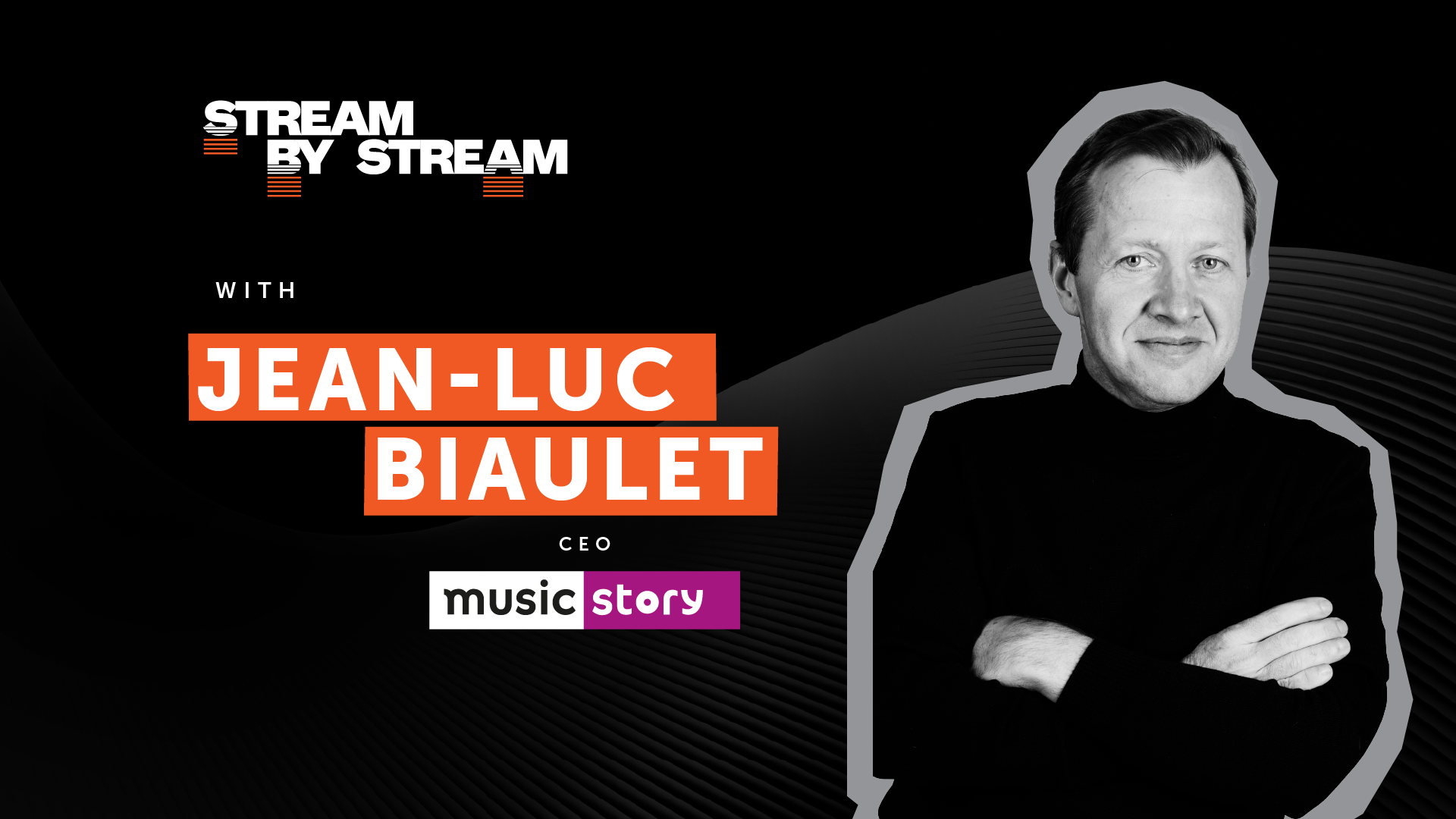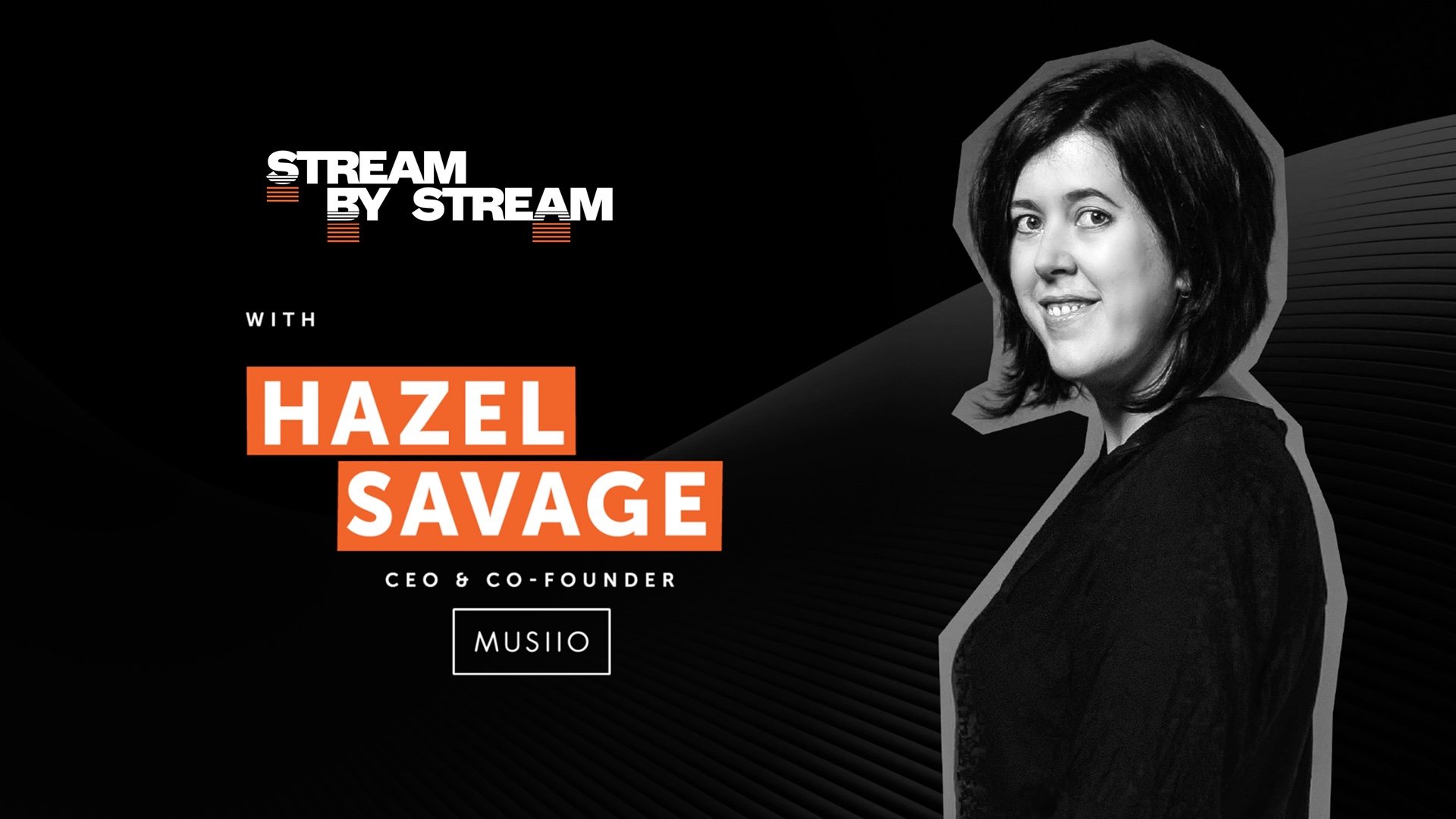 In this episode of Stream by Stream, Spiro Arkoudis, CRO of Tuned Global demystifies the role of enriched metadata for the music streaming industry with Jean-Luc Biaulet, co-creator of Music Story.
In this episode of Stream by Stream, Spiro Arkoudis, CRO of Tuned Global demystifies the role of enriched metadata for the music streaming industry with Jean-Luc Biaulet, co-creator of Music Story.
What are the risks of inaccurate or sloppy metadata? How do Deezer and other digital music services boost user engagement through enriched music metadata? What criteria should Digital Service Providers (DSP) look at when they are looking for a metadata provider?
You've been in the industry ecosystem for a long time, particularly around music services. You work with quite a few popular music services and I'd love to hear a little bit of background on that.
I'm an engineer working in databases and my background is in the business intelligence world, data warehouse back in the day.
I was working for retail and I decided to create Music Story 12 years ago because music is a real passion for me. At this time I also felt the direction digital music was taking with streaming and I could see, from my technical background, a huge need for technical skills to solve all the millions of problems that inevitably would happen in this context.
When people hear reference to “metadata”, generally they think that it contains an artist's name, a song name, maybe some cover art. But is that it, is there more to that?
Yes, there is far more information than that. I would perhaps propose a little classification of different types of metadata.
- First, you have IDs (identifiers), which are very important to track the streams and collect the royalties. It's the most important part in all the music industry. And they are not always done properly in all the music industry and we often have problems to fix with IDs.
As an example you have ISRC (International Standard Recording Code) and ISWC (International Standard Musical Work Code) identifiers.
ISRC is found in the publishing world as an identifier for products, whereas ISWC is used in the music recording world for songwriters and composers. From a metadata perspective, having the correct identifying information means artists, musicians and songwriters will be paid. - Secondly, there are descriptors. You don't only have a title, you also have genre classifications or mood classifications on the track and many other descriptors that could help you understand what this recording is about.
- Another type is the associated content. When you deal with metadata you always have to face the associations with other content rights. When you match an artist's image and a recording, for example, you are facing a lot of issues with the rights associated with artists' images. The same goes with text-like biographies.
- The fourth one is not really metadata but you still have to deal with it. It's all the data collected around the usage, and all the information a streaming service can collect, such as what this person is listening to at specific times or in a specific area. They are collecting a lot of metadata and connecting it in different ways to the other metadata mentioned before. So it's important to deal with that as well.
Is there a metadata standard that people/artists should know about when new releases have been generated? Is there a spreadsheet or a CSV file? And what's the real risk if it's inaccurate or if you have sloppy metadata?
In the music industry, we have a chance to have a Digital Data Exchange standard (DDEX), but DDEX standard is mainly to rule the relationship between the supply chain from the labels and the DSPs.
It’s pretty high level technically, it is more a standard of communication between these actors. You have several parties involved, such as the metadata providers, the recording studios, the publishers etc. It's a huge undertaking by DDEX but it's not really a standard, it's just a way to frame technical communication between the actors.
What artists and others should know is there are a lot of players now in the music industry dealing with metadata. For studios, you have very good software (e.g Soundways, VEVA) to just type in your ISRC, the credits or similar precious information. You also have a lot of digital distributors now and digital rights platforms that are dealing with metadata and all issues of the metadata for the artists. So there is no real standard, there are players and communication standards instead.
When people refer to enriched metadata, it's really to ensure it's not just the basics but it's beyond that, as it not only impacts usage and rights, but also the user experience. Which then also impacts recommendation engines. Is it why DSPs would come to someone like you to help them optimise their system or even differentiate their offer to stand out from the others?
Yes. It's what we intend to solve, because now DSPs are facing so many issues in using metadata for better experience for the users.
They have to deal with metadata quality issues because the music catalogues they receive are not clean. Then to enrich the metadata and to get good coverage, you have to ensure the right content for the right recording on your service, as it is very key for their user engagement.
So if I am a DSP the reason I am going down the path of enriched metadata ultimately is because I want to increase the user engagement time. It means more consumption, more streaming, which means more royalties for artists and labels. The knock on effects are advertising revenue or data consumption if you have a partnership with a telco for example.
The end goal of every DSP is more consumption and greater engagement time and that absolutely comes together with an enriched metadata service.
For example, a record label comes to you needing to optimize its metadata. They have around 40,000 tracks and they want to work with a DSP so they provide their content to you. What would be the process on your end to analyse that data?
When it comes to metadata you have a lot of metadata providers and first, you have to get the coverage and the license. As I said before there are licenses for images, text etc, but nowadays it's not enough.
At Music Story, we only work in the music area and we listen to our clients and all the issues they are facing so we can provide services for all those situations; such as doing a better matching between two different sources, getting complementary content from more sources and clear assets’ rights.
Each DSP has specific needs and we provide a dynamic response to them. DSPs have to face so many different sources of metadata such as lyrics, images etc, and they have to get all this together to bring a really good experience to their users.
They need one partner that is able to aggregate, to curate, to match, to clean your catalogues (e.g disambiguation of artists which is often one of the first issues).
You now have a lot of new technical tools to do that. We are talking a lot about AI lately but, for me, it's not enough. It's more like a kind of digital music engineering to increase the level so the DSP can focus on the user experience.
Is it good for my user, or is there a good response for that, rather than dealing with all the backend data issues?
What criteria should a DSP look at when they're looking at a metadata provider? Can you list out a couple of key items that you think are important?
You have to look at the coverage (licensing and right to use the assets) first because each provider is unique. They have their platform and their key markets/territories so you have to look at that too.
The quality of their data is also a major factor. Now we use AI and the quality of AI-produced metadata is increasing, but it's not solving everything.
Today we still need musicologists, people who can work very specifically on very important parts of your catalogue. You need technical tools but you also need editorial people taking care of the very important part of your catalogue.
At Music Story we intend to be a partner in time, not just license content, but to listen to the issues, to the problems — and to be able to work as a catalogue team and try to solve the problem and bring solutions time after time to our clients.
I think it’s very important to have this kind of partnership when you look for a music metadata provider.
For me one of the most important questions when you are a DSP starting a new platform is about metadata as the issues coming from it are underestimated 90% of the time.
DSPs need to anticipate this otherwise they will spend a lot of the workload fixing all issues and trying to match content together while realising there is some catalogue coverage missing.
So even if part of this core process has to be done internally, a lot of it is not core and would take a lot of money and human resources to deal with it. The question is, do I have the right content, the right partner and the right skill to solve these problems for me to focus on the value and on the user experience?
That's the most important part for me and the most important question you have to ask yourself.
You're saying that the human touch is still really important in terms of taking it to a level where potentially machine learning, or AI, is not at the moment. So is AI metadata the same as enriched metadata and how do they overlap?
Whether it is machine learning or deep learning, it's still “learning” so you have to learn something.
You need a human first to say, this is this genre and I feel like this when hearing this song, so the “machine” can learn. There are lots of AI companies in music and beyond that you still have the musicologists who know the classification.
Also, AI is not old and it’s just a tool.
So I think the future is more about how to use AI correctly in this context and try to solve the issues, more than having the big magic solution being able to provide all the metadata.
When you see a person pretending to have all the metadata, be suspicious and think twice.
I think people generally still don't understand the complexity of music metadata. I've been in the industry a long time and I just realised now that metadata extends to lyrics and biographies. So I reckon the bigger you become, the more you dig and the more you realise that’s not right and something has to be done, right?
I often hear new DSPs saying, it's not that important to do biographies or lyrics at the moment and that it will come later.
Ok, why not... So they focus first on the music experience and the audio files, but quickly after you need to provide information.
You have to give your service a good search engine so your catalogue is searchable. So it's also a concern for the artists, how can they be found correctly amongst millions of tracks?
It’s when they reach that stage that DSPs realise that it's important for search engines to get additional information. From this point, they have to face the coverage and the licenses and they often start thinking that they want to take it all in and have all the metadata to provide the best experience. But this is another trick or trap in fact.
My recommendation is to be humble enough and focus on a specific section of your catalogue coverage first. For example, start with your top 5,000 artists in a specific country and just focus on adding the best content to them as they might represent 80% of what your audience listens to.
Since 2020, data shows that most DSPs have seen great traction in terms of engagement due to people consuming more music and content during our pandemic. From your side, are you seeing trends that enhanced metadata services will impact or will be required to benefit the users and the industry?
At Music Story, we are working behind the scenes, but I have been really impressed with the live events in the video games world, such as what Roblox is doing with music and the gaming industry globally.
We are talking a lot about live streaming but it means creating new habits as people are not used to that. They just want to go back to the concerts, and perhaps concerts in the future will include live streams, but there is a business model to build around that.
However, when you do a live concert inside a video game platform, with millions of young people already there, just wanting to play and interact, that's really impressive and it has a lot of potential in my view. I am sure we will see a lot of traction in this area and a lot of investments will go that way.
The need for enriched metadata is going from DSPs into the gaming world and we’ve seen a lot of fitness companies taking that road and other markets getting involved in music.
So the need for enriched metadata is really growing as more and more people come onboard.
One other trend that is less obvious, but I can see from behind the scenes, is a more professional approach of the DSPs. Streaming has existed for more than 10 years, DSPs are grown-ups, and they are getting more experienced and organised.
They now have new trades and skills to specifically deal with data or the user experience. That's very important to me because now they are taking metadata and information very seriously.
The quality standards, even on the small part of metadata, are increasing a lot, which is good because we are here for that, and we're following that. Their teams in this area are growing very quickly.
Do these companies have a worldwide approach or are there some particular markets driving that need to go to the next level? I am thinking of India for example, which I see as a complex market with multiple languages and specific genres or South East Asia where each country is unique.
Now you have this complex situation dealing with local content and editors, and worldwide content and editors, and to have the consistency between those two to work.
So the question for DSPs is should I just make a unique worldwide solution or should I bet a lot on the local skills? If you are planning on checking every box you will spend a huge amount of money. Some could do that perhaps, but not all of them. It’s really key to prioritise your work with metadata.
When you are done with UX, pricing, catalogue and licensing with record labels, you have a really good platform but how to make a difference?
Metadata is surely part of the answer.
Stream by Stream is a Vlog produced by Tuned Global to share expert insights about the streaming industry and how to launch and grow a powerful streaming service.
Music Story technology can be used by Tuned Global White Label streaming app or Streaming Service APIs clients to add enriched metadata to their music streaming service and enhance their user experience.
If you found value or insight from this post, please consider sharing it on Twitter or Linkedin.
Thanks for reading!
Follow Tuned Global and always be in the know.
Follow @TunedGlobal





